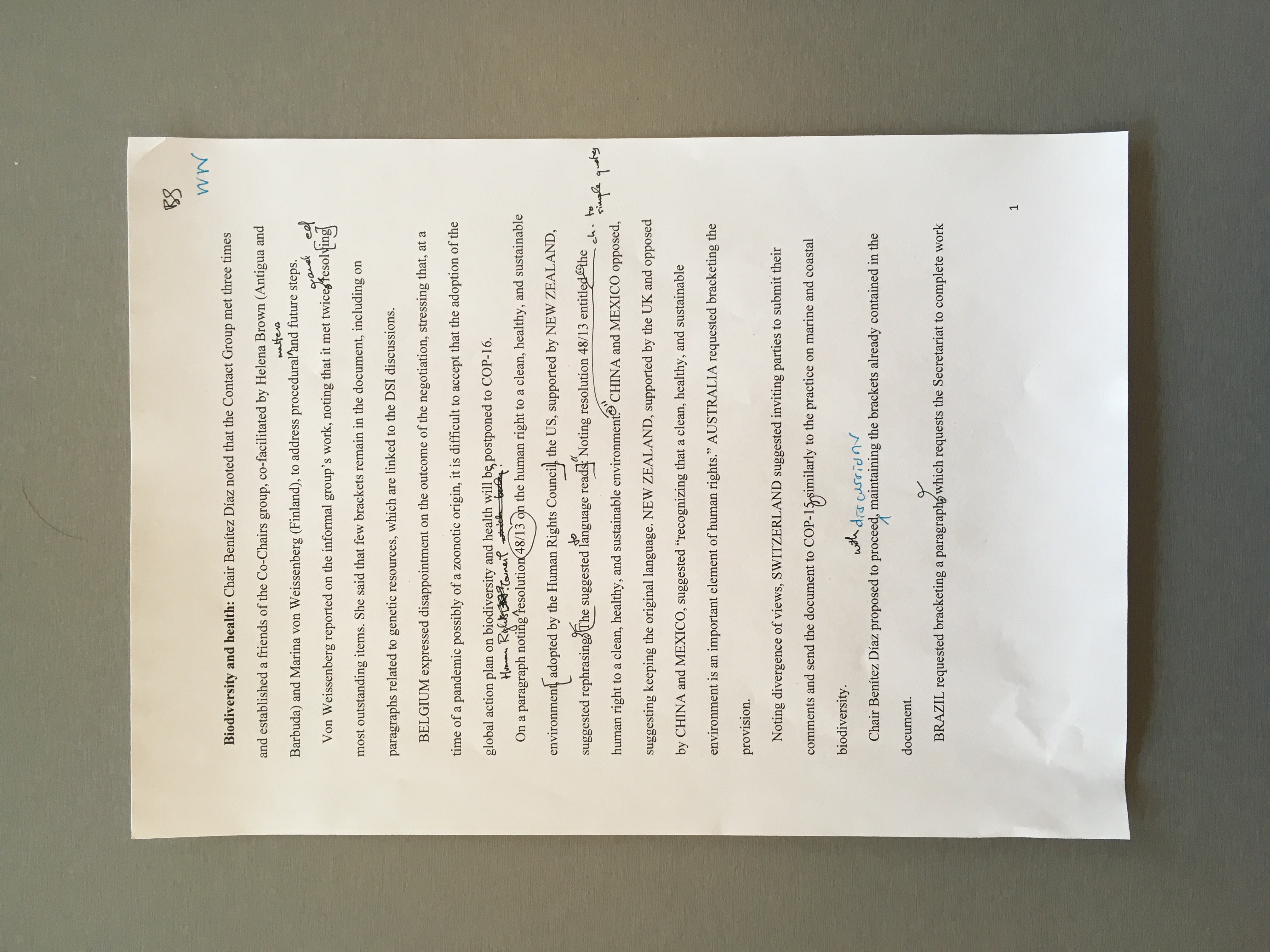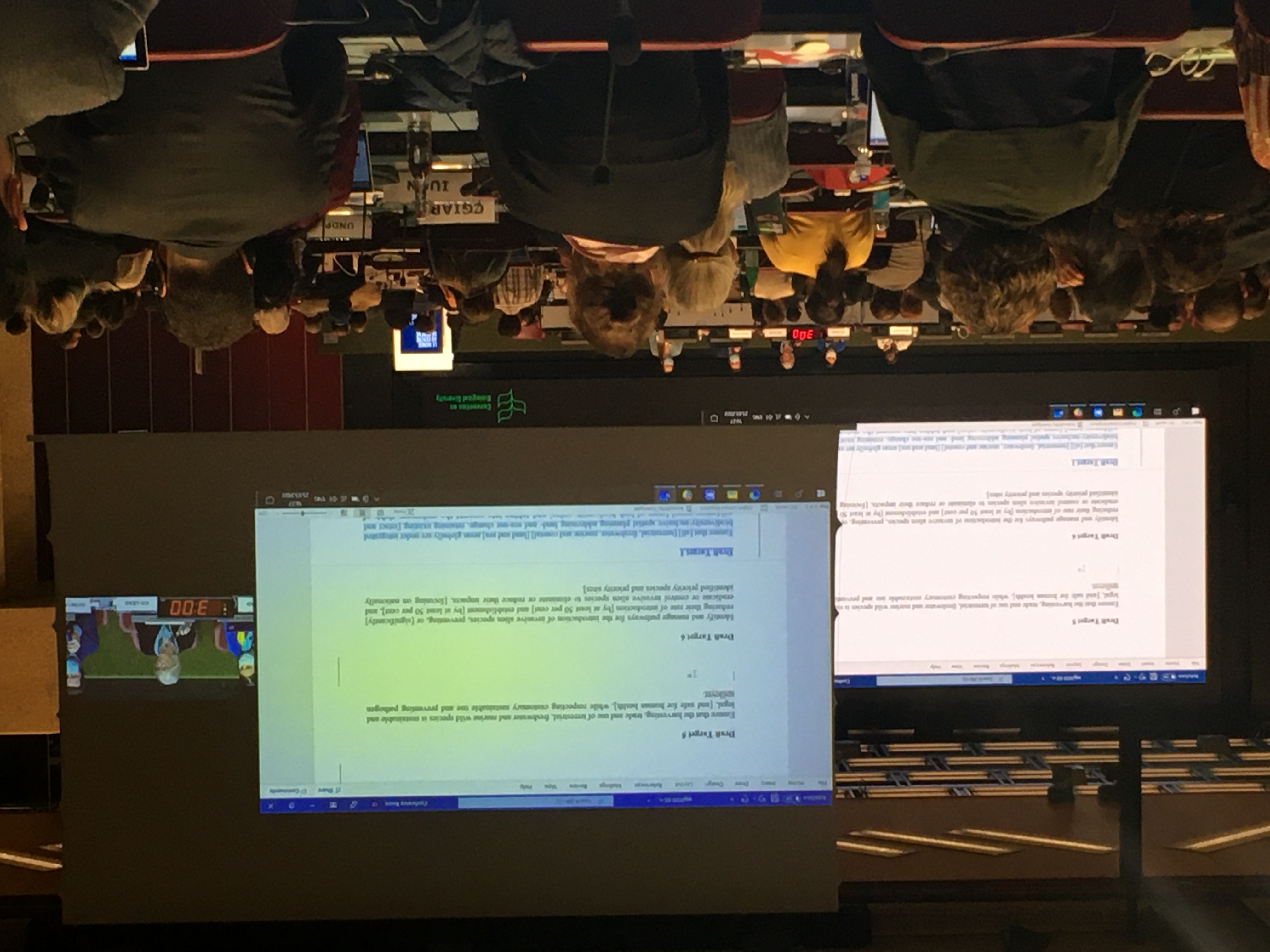[FMAL-14] Spend it all
Saturday morning, friends, and the last Saturday morning we’ll have here. Tired, because I left work at ten PM. Brain-frazzled, because my whole day was spent writing. And then writing up. So let us dive under the hood of what makes my mental process feel like warm butter left in the sun, shall we?
This is Fondue, or Maybe a Lake and I am Bernard Soubry, as always. This is your fourteenth email.
When I describe this job to folks, I usually say that our task is to write up everything that’s being said in negotiations and then condense it into two pages that we publish each night. This is an incomplete description.

Earth Negotiations Bulletins have a tiny little section called In The Corridors, which is a bit of a free-for-all. Whatever rumours we’ve heard, rants of frustration, deep desires confessed to us from delegates… it all goes in there, anonymous and uncut. It’s sort of like looking into a multilateral environmental governmental process’ equivalent of a teenage diary. As you can imagine, it’s incredibly popular, because it’s the one thing that people have to read that doesn’t have intense legal implications.
The ITC is the one thing I really love to write in the Bulletin. It's actual writing. It’s a chance to use verbs other than suggested, noted, stressed, underlined, and put forward. But it's also an exercise in non-ego writing that I’ve been struggling with, to be honest.
We write the Bulletin collectively, and we edit collectively. This means that none of the tens of thousands of words I’ve written over the past thirteen days ever come out exactly as I’ve written them. Stuff gets cut for space, or integrated into other decisions. Subtle descriptions that you make on a particular delegate’s tone and its implications never even make it to print. We edit collectively, with each writer taking a pass at the full, printed text, so that you never know either who wrote it or who changed it.
Largely, this is a wonderful thing. The masthead has all of our names, but their order doesn’t matter: the Bulletin is a collective, the synthesized viewpoint of five smart, cutting people who want to give as little biased a version of the narrative as they can to the rest of the world. It should be egoless; the writing should be unadorned, clear, empty of metaphor. It should be a useful tool.
But the ITC—well, I try to keep that mentality, but dangit if I don’t feel like someone’s taken a cheese grater to my inside stomach wall when I see a penstroke through one of my metaphors. For eleven and a half hours a day, I write the truth; for half an hour, I write the truth, but slightly prettier. Who the hell does this collective sense of editing think it is, to take away my perfect process pun?
Which is why it’s such a good exercise. I want to live in a world where writing isn’t a translation of my ego. I want to build up the muscle of letting go: make a thing, put it in the hands of others, move on. Spend it all the moment you have it, the way Annie Dillard talks about things. I really do.
So each night, as we stay up trimming and adding in and copy editing, I have a little ritual. I look at my pass at the edits and ask myself: is this the hill I'm going to die on? Usually, the answer is no. And I let go of it.
There's something truly reassuring to the kind of writing we do--its immediate utility, its historical utility, but its total lack of stylistic posterity. People talk to us all the time about how much they love the Bulletin and how useful it is to them. But no one is going to come up to me and tell me how much they liked that Rilke reference in the ITC three days ago. First, they don't know it's me; and second, you don't say that about a tool. You just use it. People don't compliment hammers.
In that way, writing becomes as useful a thing as making any other material. People who make coats work hard, and agonize over stitching, and do their best to make sure their work is warm and waterproof and stylish; and then they let it go. And no one who wears a coat thinks that much about its maker. They might be generally grateful to them, sure, but they're mostly happy to be warm. Every night, I have to remember that: we're just sitting here, making coats. And that's enough.
That said—I do confess to putting jokes back in after they’ve been cut sometimes, just before we go to print. All paths to the Buddha have pit stops sometimes.
Yrs for a few more days--
B

Here’s our ITC from yesterday:
“Dear delegates, we’re still in March,” one wry voice rang out in the afternoon plenary on Friday. “It is far too early to decorate Christmas trees.” Yet some unexplainable holiday spirit seems to have taken hold of parties in the past days: discussions saw documents festooned with additions, and more give than take on “streamlined” text.
Movement remains slow. The morning’s SBSTTA plenary couldn’t address all of its intended documents. In the afternoon, target-by-target navigation rapidly transformed clear text into the Co-Leads’ worst nightmare: an overload of amendments—all bracketed, of course. “This isn’t the time to get steamrolled by every delegate who wants to add an ornament to the tree,” a participant grumbled over cheesecake. “This is a party-led process, but unless facilitators crack the whip, we might not make it to the plenary unscathed.”
Yet some strategic voices reminded those who were disappointed that this dynamic, much like Christmas, is a tradition—something hard to avoid, but that can still lead to celebration. One seasoned delegate suggested that, so late in the game, it’s time to pick the battles that can be won and wait until the COP to settle the rest. “If we can agree on goals, targets, and milestones before Kunming, we’ll be OK for the rest,” they mused. Here’s hoping that the holiday community spirit prevails before the final plenary.